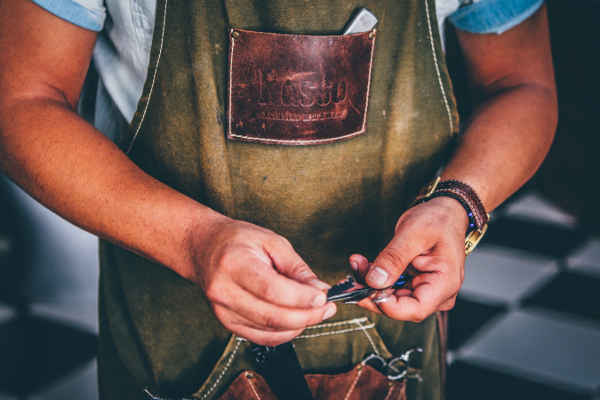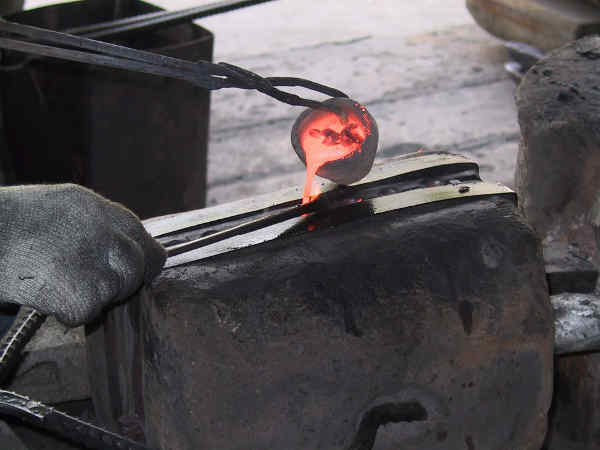how to become a blacksmith
Blacksmithing can be a great hobby. But what if you want it to be more than just something you do in your spare time? What if you want to turn blacksmithing into a career and become a full-time professional blacksmith?
How to become a full-time professional blacksmith. It's best to start off slow and take on blacksmithing as a hobby to see if it's something you like. Start by reading up all about smithing, and then try out some local classes in your area. If you've been working with metal for a while and still love it, it's time to get an apprenticeship and eventually open your own blacksmith shop.
In this article you'll learn what makes a professional blacksmith and how to become one. As well as what a blacksmith does day to day, what skills are needed for the job, and more.
What Is A Professional Blacksmith?
In my opinion, a professional blacksmith is anyone who earns a living from blacksmithing.
Depending on your own opinion, that might only be someone whose primary source of income is their blacksmith work. Or you might consider someone who earns a side income by blacksmithing to also be a professional.
A hobbyist blacksmith can be anyone who owns a forge and anvil and is capable of making nice things. In my eyes, you become a professional blacksmith once those nice metal things you create are products that people are willing to pay money for.
Think about it. What's the difference between a professional painter or writer compared to someone who just does it as a hobby? In my eyes, the difference is that they sell their work to earn money in addition to just doing it for fun.

How To Become A Professional Blacksmith
So that's all there is to it, right? I just need to get an anvil and create stuff that people are willing to pay for?
Not so fast. Becoming a blacksmith might sound simple and straightforward, but there's a process to go through from a complete beginner to get to the point where people are willing to pay you for things that you make.
Luckily the process isn't all that long. With a year or two of hard work, you should be able to get to that point.
Like any profession, you can't become an expert at it overnight. It takes a lot of patience, hard work, and determination. But if you're passionate about becoming a blacksmith, you can do it!
Whether you're finishing up high school and looking for a career, or you're fed up with your current career and looking for a new career path, there's an opportunity to get into blacksmithing at any stage of your life.
Look Up Online Resources, Watch Videos, and Read Books
I'm assuming you're a complete beginner when it comes to blacksmithing at this point. Before it's time to reach for your hammer, you've got some basics to learn first.
There's a bunch of tricks of the trade that you'll pick up once you start actually working with metal, but it's best to get some of the basics out of the way up front. Luckily just by the fact that you're here reading my website, I can tell that you're already on the right track!
Unlike blacksmiths in the olden days, we're fortuitous enough to have the internet at our disposal. That means you can learn tons about blacksmithing just by watching Youtube videos and reading articles.
Sometimes nothing beats a good book though. A well-written book about blacksmithing condenses all of the basics you need to know into one great resource. If you're looking for a first book on the topic of blacksmithing to get you started, be sure to check out my resources page!
If you're anything like me, you get completely absorbed into a new hobby once you lock your sights on it. So you shouldn't have any problem getting started learning everything you need to know about blacksmithing. You're eager and excited to learn everything you can about the topic!
Take A Class (or Three)

Once you're confident that you've learned enough about blacksmithing to avoid embarrassing yourself, it's time to take a class!
There are online classes about blacksmithing you can work through, but I definitely recommend looking for an in-person class if you've got one near you.
You don't need to sign up with a year-long course at a vocational school. Check with existing professional blacksmiths in your area. They often offer afternoon workshops where you can get your feet wet into the world of blacksmithing and make sure it's something you're really interested in.
Normally a day-long blacksmithing class will work you through the whole process of creating your own axe or something similar. And at the end you get to take your work home usually!
Nothing beat getting hands-on training from a master blacksmith. You'll learn basic safety, plus get to apply everything you've learned about blacksmithing tools and techniques in person.
After you've taken a few beginner classes, why not upgrade to intermediate and advanced metalworking classes? You'll learn skills in both contemporary and traditional blacksmithing that will set you apart from other smiths.
Start Your Own Blacksmith Workshop
So now you've taken some classes where all the tools and supplies were provided, and you've decided that you're still in love with blacksmithing.
Now it's time to make the commitment and start buying all the stuff you need to start smithing for yourself.
Don't go overboard, because it's easy to become too enthusiastic and drop thousands of dollars on your new hobby.
You can get started with the bare necessities like a forge, a hammer, an anvil, tongs, plus some safety equipment.
Once all your gear arrives, it's time to start doing what you love. You're a real blacksmith now! Although really more of a hobbyist or dabbler still at this point. But that's perfectly fine, you're still learning!
Find An Apprenticeship
So you've exhausted all of the blacksmith classes that are offered near you. You've read all the books and even taken all the online courses. And you've put in dozens of hours working on your own anvil.
If you're serious about this professional blacksmith thing, the next step is to become an apprentice.
It might be hard to find a professional blacksmith in your area. If you live somewhere really remote, you might even need to move to do your apprenticeship. Although you can look at related options like working with a master farrier instead of an actual blacksmith.
An apprenticeship is where most of your learning will take place. You've got the basics down, but now it's time to really refine and hone your skills. Learning from a blacksmith with years of experience will really accelerate your skills.
Some apprenticeships are paid, but if you're going to make this blacksmith thing work then you might even need to be open to the idea of an unpaid apprenticeship.
Create Your Own Blacksmith Business

You should stay in your apprenticeship for at least a year. But eventually it's time for the student to leave their sensei and start making a name for yourself.
You've got the knowledge, you've got the skills, you've got the tools. Now it's time where you're ready to take the final step toward becoming a professional blacksmith.
It's best to start small and expand your business gradually over time. You might even just start doing it in your backyard to begin with, as long as that complies with your local business laws.
There's more to being a full-time blacksmith than just banging pieces of metal though. You'll need to market your blacksmith business to attract clients, and take care of all the other aspects of running a business like taxes and administrative tasks.
Building a good base of initial customers is key though. Those first few people you work for can make or break your business, so do whatever you can to make sure they're satisfied and happy with your work. Word of mouth can really work wonders in your favor, but it can also sink your hopes of being a full-time blacksmith if people have bad things to say about you too.
Instead of being a general blacksmith, it's a good idea to specialize in one particular aspect of the craft. Figure out what you enjoy and you're best at, and focus on that.
Are you more interested in creating artistic pieces, or practical ones? Maybe you'll focus on only creating wrought iron gates, or just staircase railings. It's a great idea to pick something to specialize in that other blacksmiths in your area don't already do, so that you don't have to worry about competing with more experienced smiths.
Once your shop is all set up and you've made your first sale, congratulations. You're now officially a professional blacksmith!
The Growth Phase
Once your business is established, just keep doing more of what has been working so far. Increase your amount of marketing and customers. Expand your shop. Maybe introduce a new line of products if you're sick of making the same thing over and over again.
If you've got more business than one person can handle, it's time to give back and start working with apprentices and interns of your own. Not only will you be helping the next generation of blacksmiths, but people will see your business as more professional when there's more to it than just you.
Keep practicing and learning new things.
What Does A Professional Blacksmith Do?
Okay, so if you're a beginner maybe all of that explanation got too far ahead and you're still not exactly sure what a blacksmith does, let alone if you want to do it!
A professional blacksmith shapes pieces of metal and joins them together. They get pieces of metal super hot in a forge to the point that it becomes soft and workable. They can make things like tools, furniture, iron gates and railings, and horseshoes.
Some blacksmiths focus more on decorative ironwork. Stuff like sculptures, gates, and furniture.
Other blacksmiths do more industrial work and create things like specialist tools, fire escapes, or other more practical items.
Blacksmithing involves working with a furnace or forge. They shape metal using hand tools like tongs, anvils, hammers, and punches. As well as power tools like hydraulic presses and drills.
Blacksmiths can work with a variety of metals. Most commonly steel and iron. But some also specialize in work with copper, bronze, and brass.
Technically a smith who works with gold and silver aren't blacksmiths. They have their own respective professions, goldsmiths and silversmiths. It's much more delicate and intricate work than blacksmithing.
Blacksmiths might sell their work exclusively in their own workshop. Or they might travel to sell their products craft shows and fairs, or put them for sale in art galleries.
What Skills Does A Professional Blacksmith Need?

A blacksmith needs good hand-eye coordination. You'll need to accurately hit a piece of metal over and over, in the same place and with a precise amount of power.
Some people think that being a blacksmith just means hitting a piece of metal as hard as you can. But that couldn't be further from the truth. There's a specific time when a blacksmith needs to swing with all their might, but much of their movements are very controlled and precise.
You'd make a good blacksmith if you're creative and enjoy working with tools and machinery, and you don't mind getting a bit dirty.
A full-time blacksmith who runs their own business will need a bunch of other skills as well. They'll need to be good at working with numbers, have the knowledge to run a business, be able to communicate effectively with customers, and have the discipline to get up and grab their hammer every day.
Blacksmithing is quite demanding physical work, so you should be in good shape and expect to get a good workout from your job as well.
What Kind Of Hours Do Blacksmiths Work?
If you've got the clientele for it, you can easily work 35 to 40 hours per week as a blacksmith. Maybe more, depending on how ambitious you are.
What Kind Of Salary Does A Blacksmith Make?
In the US and Canada, blacksmiths make an average of about $35,000 per year. Although that can vary wildly, especially since most blacksmiths are self-employed. That's pretty close to other metalworking jobs like being a welder or solderer.
In the UK, blacksmiths start off at a salary of about £15,000 (about $19,000 USD) but can easily earn £25,000 ($32,000 USD) or more per year once they're more experienced.
A more skilled blacksmith is able to charge more for his work than a mediocre one.
What Is The Work Environment Of A Blacksmith Like?
As you might expect, being in a blacksmith's workshop isn't a walk on the beach.
It's hot, sweaty work dealing with red hot or molten metal all day. And there's a bunch of heavy lifting involved.
Blacksmiths use a forge to heat up their metal to a workable temperature. Then they use a variety of tools to shape and manipulate it. Most commonly a hammer and an anvil. Although other tools are used to pull, bend, and twist the metal.
You don't become a blacksmith because it's an easy job. It's not like sitting in an air-conditioned office all day. It's something you do because you love it. The best part of being a blacksmith is starting with a hunk of solid metal and seeing it transformed into a finished piece of work.
What Education Does A Blacksmith Need?
Formal education and certifications are completely optional for blacksmiths in the vast majority of places. You can have a successful career as a blacksmith without any formal education. Although attending a trade school or getting a degree can put more authority behind your name, especially while your business is brand new.
Colleges that offer courses in blacksmithing are getting more and more rare. But some trade schools might offer programs if you do want to go the formal education route.
Like most similar trades like welding or metalwork, most of your education will really come in the form of an apprenticeship where you can learn hands-on under the guidance of an expert blacksmith.
Because of the other aspects of the business like keeping track of finances and dealing with customers, I'd recommend at least having your Grade 12 to become a blacksmith.
Q: What regulations and laws will apply to my blacksmith business?
A: At least in the United States, you don't need any specific license or certification to be a blacksmith. However, depending on what state you live in, you might need a business license to be able to publicly sell goods.
You may also need a sales tax license. This will allow you to buy items that you plan to re-sell (like steel ingots) without having to pay sales tax.
You'll need to check with your local zoning laws to see where you can operate your blacksmith shop. It's usually considered a manufacturing business. Although you may be able to argue that your business is actually an "artist studio" which might give you more flexible options.
There might be local environmental regulations, especially if you're burning coal in your forge instead of gas. There could be fire and noise ordinances that you need to comply with.
You should probably have business liability insurance even if it isn't legally required where you live.
Q: How will a blacksmithing business affect my taxes?
A: You should check with an accountant or tax professional in your area to confirm what your local laws are, especially if you're making a substantial amount of money from your business.
The bad news is that you'll need to claim any income that you earn from your blacksmithing business.
The good news is that a lot of the things you use in your business can be deducted as expenses. That includes all your tools, raw materials and fuel, rent if you're paying for a workspace, vehicle mileage and maintenance, insurance, advertising and marketing costs, your insurance, and lots more.
Make sure to keep all of your receipts and a record of all of your transactions for your accountant!
Employees add a whole other layer of complexity to your business, so if you reach that point then it's definitely time to consult with a lawyer and accountant.
Ready to start your journey to becoming a professional blacksmith?
Check out my resources page to see some of the gear and resources you'll need!
how to become a blacksmith
Source: https://blacksmithu.com/how-to-become-professional-blacksmith/
Posted by: ansellhoch1985.blogspot.com

0 Response to "how to become a blacksmith"
Post a Comment